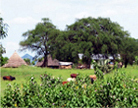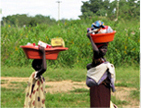Hon. Dak Duop Bichiok, Minister of Public Service and Human Resource Development,
Hon. Barnaba Marial Benjamin, Chairman of South Sudan-China Friendship Association,
Hon. Deng Dau Deng, former Acting Foreign Minister,
Prof. Robert Mayom Deng, Vice Chancellor of the University of Juba,
Prof. Liu Hongwu, Director-General of the Institute of African Studies at Zhejiang Normal University,
Prof. Melha Rout Biel, Executive Director of the Institute for Strategic and Policy Studies,
Mr. Xiong Jie, Chairman of the Chinese Business Association in South Sudan,
Mr. Li Guanghua, Chairman of the Overseas Chinese Association in South Sudan,
Dear experts and scholars,
Friends from the media,
Ladies and Gentlemen, Friends,
Good morning!
"Spring scenery greets the eye; sweet blooms perfume the air." Such is the delight of April in China, full of exuberance and vitality, as depicted by an ancient Chinese poem. And South Sudan, too, has just left the sweltering heat behind, welcoming the cooler and more refreshing rainy season. I am delighted to gather in Juba with scholars and guests from both China and South Sudan to jointly open the Third China-South Sudan Think Tank Forum.On behalf of the Chinese Embassy in Juba, I wish to extend a warm welcome to Prof. Liu Hongwu and his team coming from afar to the Forum, and sincere appreciation to all the friends from the government, universities and think tanks of South Sudan for their support and participation.

Five years ago, at the initiative of the Embassy, the China-South Sudan Think Tank Forum was established, forging a channel for dialogue between experts and scholars from both countries. The forum has played a positive role in promoting the overall development of bilateral relations by tightening the bonds of people through the exchange and integration of ideas, enhancing mutual understanding through learning from each other, and serving the greater good of both nations.
As this year will witness the 75th anniversary of the founding of the People’s Republic of China, the next summit of the Forum on China-Africa Cooperation (FOCAC), and the 13th anniversary of China-South Sudan diplomatic relations, experts and scholars from both countries join hands once again in Juba. Today, under the theme of "Strengthening Partnerships for Common Development", we should offer insights and ideas to sustain and elevate China-South Sudan cooperation for long-lasting progress, and contribute our wisdom to the building of a China-Africa community with a shared future. Here, I wish to avail myself of this opportunity to share a few thoughts on the cooperation between China and South Sudan and that among the think tanks.
Firstly, we should jointly implement the Global Development Initiative, deepening China-South Sudan pragmatic cooperation across the board. Development is the master key to solving all problems, and it’s also placed at the center of our cooperation. Through China’s endeavors of implementing the new development philosophy and creating a new pattern of development, we stand ready to promote high-quality development of China-South Sudan cooperation, and to give more support to the economic and social development of South Sudan under the frameworks of the Belt and Road Initiative and the FOCAC. Actively responding to the appeal from H.E. President Salva Kiir Mayardit to "scale back humanitarian programming and devote more energies to development support", China has constructed and commissioned a series of key projects including China-aided Clement Mboro Bridge in Wau, China-aided Broadcasting Facilities, renovated Juba International Airport, and Air Traffic Management System one after another. The construction of the Juba-Rumbek road has also made substantial progress in its current stage. Fruitful cooperation outcomes have also been delivered in fields including energy, agriculture, education, health, and emergency humanitarian response, effectively enhancing self-development capabilities of South Sudan. China encourages its enterprises to bolster their investment initiatives in South Sudan, thereby facilitating the creation of a conducive landscape that spurs progress and attracts further growth opportunities. It’s hoped that South Sudanese government could continue to improve its investment and business environment to ensure sustainability of China-South Sudan pragmatic cooperation.
Our friends present here may have noticed that, affected by the international environment and the conflict in Sudan, South Sudan's economy has recently faced challenges. Persistent inflationary pressures are increasing, the effective supply in the market is apparently insufficient, and the issue of youth unemployment has become more prominent. Under these circumstances, how can South Sudan's agricultural development be leveraged to address food insecurity? How can its indigenous products be marketed internationally? What comprehensive strategies can be implemented to increase the country's diversified income and promote local production? How can we effectively boost the investment confidence of foreign enterprises, including Chinese companies, in South Sudan? These questions, vital to the economic and social development of South Sudan and our bilateral relations, are always on the Embassy's mind. We also hope that you will fully exchange and discuss these topics at this Forum, leading to valuable policy recommendations.
Secondly, we should jointly implement the Global Security Initiate, advancing the peace process in South Sudan. History and reality both show that peace and stability are the common aspirations of the South Sudanese people, the biggest consensus of the international community, and the prerequisite for the country’s development. Seventy years have passed since the Five Principles of Peaceful Coexistence were proposed. Over the past 70 years, the Five Principles have become basic norms governing international relations and fundamental principles of international law. Far from becoming obsolete, principles such as non-interference in internal affairs have even demonstrated more vitality than ever. At the opening ceremony of the 8th FOCAC Ministerial Conference in 2021, Chinese President Xi Jinping proposed that China and Africa will jointly implement a "peace and security program", reiterating China’s support for African countries' efforts to independently maintain regional security. As a permanent member of the United Nations Security Council and an international witness to the Revitalized Agreement, China has played an important and unique role in the peace process of South Sudan by measures including providing in-kind assistance to the unified forces and supporting the mediation efforts of the IGAD and the African Union. The international community should respect South Sudan's sovereignty and its efforts to explore a development path suited to its own national conditions, offer more substantive support, and lift the arms embargo and sanctions against South Sudan as soon as possible, to create a more favorable international environment for the peace and development of South Sudan.
The election is currently the hottest topic in South Sudan, and I would like to take this opportunity to share our views on this matter. Firstly, China welcomes South Sudan's first election since its independence, supported by the international community. The election is not only a critical step in implementing the Revitalized Agreement and completing the political transition in South Sudan, but also reflects the mainstream public opinion. China supports the United Nations, the African Union, and IGAD as the main channel for election assistance in South Sudan and is willing to offer as much help as possible in this regard. Secondly, China upholds that peace and stability are the bottom line for the election in South Sudan. All relevant parties should prioritize the overall interests of the nation and its people, properly handle differences, and reach a consensus on key arrangements regarding the elections. It's necessary to strengthen the security forces, establish an authoritative mechanism for resolving election disputes, and effectively maintain social security and stability before and after the election. Last but not least, election is fundamentally an internal affair of South Sudan. There are no identical political system models in the world. Political systems cannot be abstractly judged without considering specific socio-political conditions and historical cultural traditions, nor can foreign political system models be directly transplanted without adaptation. We support the South Sudanese government and its people in independently advancing the election process in their own pace, opposing irrational external interference. From the perspective of many African countries and even globally, there is no such thing as a perfect and flawless election. We have always believed that elections are a means, not an end; the ultimate pursuit is national peace, social stability, and the happiness of the people.
Thirdly, we should jointly implement the Global Civilization Initiative, connecting our people-to-people ties. In recent years, there has been close exchange and cooperation between China and South Sudan in the fields of education, culture, youth, and sub-national affairs. For several consecutive years, we have provided South Sudan with scholarships and training opportunities, established the Alumni Association, and many South Sudanese youths have self-studied Chinese. They actively participate in bilateral exchanges and cooperation, becoming ambassadors of friendship between China and South Sudan. China has helped South Sudan build a number of schools, and implemented two phases of China-Aided Technical Cooperation Projects of Education, compiling and printing textbooks for primary and secondary school students and providing training for teachers in South Sudan. Since assuming my post as the Chinese Ambassador to South Sudan a year and a half ago, I have visited nearly half of its states (administrative areas) and inspected quite a few China-South Sudan cooperation projects. Every time I communicate with the local people, I feel touched by their spirit of struggling against hardships. I firmly believe that, as China introduces more measures to facilitate visits to and from China, including more convenient payment, the people of China and South Sudan will interact more frequently, visiting each other as often as family members do.
I often emphasize to my colleagues at the Embassy that our cooperation with South Sudan should be forward-looking and concentrate on enhancing capacity building. Since the establishment of our diplomatic relations, China has provided training for over 5,000 management and technical personnel in various fields for South Sudan. In 2023 alone, more than 300 South Sudanese government officials and professional technical personnel participated in short-term training programs in China, covering fields such as economy, trade, agriculture, education, medical care, and technology. I’m glad to announce that this year, the Chinese side will continue to deepen cooperation in human resources development with South Sudan. We will hold five bilateral training courses and several dozen multilateral courses, further supporting South Sudan in enhancing its capacity building.
Fourthly, we should jointly foster solidarity and cooperation within the "Global South", with a strong emphasis on intellectual support. Emerging markets and developing countries have formed a unique identity within the "Global South", due to similar historical circumstances, present development situation, shared development goals, and common political aspirations. President Xi Jinping highly values strengthening this solidarity and cooperation. He has unequivocally stated that China, as a member of the developing world and the "Global South", goes through thick and thin and head toward a shared future together with countries of the South. This has received positive responses and widespread support from many developing countries. China is a reliable friend and sincere partner for African countries in their efforts to safeguard independence and promote development and revitalization. China supports African countries in solving African issues in the African way, and in upholding regional peace and stability. China stands ready to strengthen multilateral coordination with South Sudan and other African countries to practice true multilateralism and safeguard the common interests of developing countries, jointly promote an equal and orderly multipolar world and a universally beneficial and inclusive economic globalization, and advance the building of a community with a shared future for mankind.
To advance the solidarity and cooperation within the "Global South" and to promote the development of China-South Sudan relations, it is essential to fully leverage the think tanks' role as a "brain trust". Scholars from China and South Sudan should actively explore new models for cooperation, participating more actively in the planning and implementation of China-South Sudan cooperation. It is not only about producing academic output but also about integrating academic studies with practice. Building on existing research, efforts should be intensified to innovate and conduct joint studies between China and South Sudan, highlighting the pioneering role of think tank scholars in promoting cooperation between the two countries. To conduct extensive research and studies is our treasured heritage, and also the vital spring that nourishes all our endeavors. The Embassy appreciates and supports initiatives by Chinese academic institutions like the Institute of African Studies of Zhejiang Normal University to actively go abroad and conduct country-specific studies and field research in Africa. It is hoped that Zhejiang Normal University will continue to maximize the potential of its South Sudan Research Center and collaborate with South Sudanese scholars in academic exchanges. By closely aligning with the achievements and experiences of Chinese modernization, and taking into account the development needs and aspirations of the South, the think tanks could proactively propose feasible policy recommendations for exploring new growth areas of bilateral cooperation.
In closing, I look forward to the sincere cooperation, exchanges and mutual learning between experts and scholars of China and South Sudan at this Forum. Amidst a flourishing diversity of ideas, it’s hoped that you could yield outstanding research results that serve the development of China-South Sudan relations and practical cooperation. Wish this forum every success!
Thank you very much. Shukran jazeelan.






